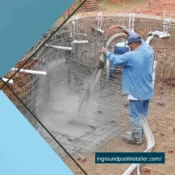Why Concrete Pools Stand the Test of Time: Exploring Durability and Longevity

Why Concrete Pools Stand the Test of Time: Exploring Durability and Longevity
In the realm of swimming pool construction, the choice of materials can significantly influence both the durability and the longevity of the final product. Concrete pools, in particular, are lauded for their enduring nature, primarily due to the robust construction process involving reinforced steel bars and a pneumatic application of concrete, known as gunite or shotcrete. This method not only provides a highly resistant structure to physical stresses and chemical degradation but also allows for flexibility in design that other materials cannot offer. As we examine the intricate processes and the material properties that contribute to the resilience of concrete pools, one might consider how these factors impact the overall lifecycle and maintenance costs associated with pool ownership. When choosing an inground pool installer, understanding these benefits can help ensure a wise investment in a long-lasting and low-maintenance swimming pool.
The Composition of Concrete Pools
Concrete pools, predominantly composed of cement, sand, and water, are reinforced with steel for enhanced durability and structural integrity. This mixture, known as gunite or shotcrete, is skillfully sprayed onto a meticulously crafted frame of steel rebar, forming the pool's robust skeleton. The application of concrete is a precise science, ensuring not only the longevity of the structure but also its ability to withstand various stresses, be they environmental, chemical, or physical.
The composition of concrete pools is crucial for maintaining the balance between flexibility and sturdiness. The steel reinforcement, often arranged in a grid pattern, provides the necessary tensile strength that concrete lacks on its own. This symbiotic relationship prevents cracking and facilitates the pool's adaptation to ground movements and temperature fluctuations, common in many regions.
Moreover, professionals in the field use specific grades of cement and sand, chosen for their purity and performance characteristics. The water-to-cement ratio is carefully calculated to achieve optimum hydration of cement particles, which is essential for achieving the desired mechanical properties and surface finish. This meticulous attention to detail ensures that each concrete pool is a safe, enduring, and communal space that brings people together in leisure and enjoyment.
Benefits of Concrete Pool Construction
Why should homeowners consider the construction of concrete pools?
Concrete pools offer unparalleled benefits in terms of durability, design versatility, and long-term value. These pools are known for their robustness, able to withstand harsh environments and heavy use without significant wear. Unlike other pool types, concrete pools can be crafted into virtually any shape or size, offering homeowners the unique ability to customize their backyard landscapes to fit their personal taste and functional needs.
To further highlight the advantages of choosing concrete for pool construction, consider the following points:
- Customization Potential: Unlimited geometric configurations and the ability to incorporate a variety of features like vanishing edges, tanning ledges, and built-in seating.
- Durability and Strength: Constructed to endure seasonal changes and long-term use, reducing the need for frequent repairs.
- Increased Property Value: Concrete pools are a permanent home improvement that enhances aesthetic appeal and increases property value.
Homeowners seeking a lasting addition to their community and personal space will find concrete pools to be a superior choice. The sense of belonging and pride that comes with a beautifully integrated, custom-designed concrete pool is unparalleled, making it a worthwhile investment for those looking to enrich their home life.
In conclusion, concrete pools epitomize robustness and durability, leveraging their composite materials and construction methodologies to offer superior longevity.
These pools, fortified by a marriage of cement, sand, water, and steel, are bastions against the ravages of time and elements.
As such, they represent a wise investment for those seeking enduring value and structural integrity.
Indeed, in the realm of aquatic leisure facilities, concrete pools are paragons of permanence and reliability. For those looking to achieve such lasting quality, choosing a reputable inground pool installer is crucial.
All Categories
- Concrete
- Concrete
- Concrete pools
- Construction
- Custom Features and Add-ons
- Design
- Design
- Design
- Design & Construction
- Design and Planning
- Features & Customization
- Infinity edge
- inground pool
- inground pool builder
- inground pool installer
- Installation
- Installation Process
- Legal & Administrative
- Materials
- planning and design
- Pool Aesthetics and Customization
- Pool Design
- Pool Equipment
- Pool Features
- Pool Features
- Pool Installation Process
- Pool Materials
- Pool Materials
- Pool Types
- Project Planning
- Renovation
- Resurfacing
- top sights
- Types of Inground Pools
- Types of Inground Pools
- Types of Inground Pools
- Types of Inground Pools
- Water Treatment



